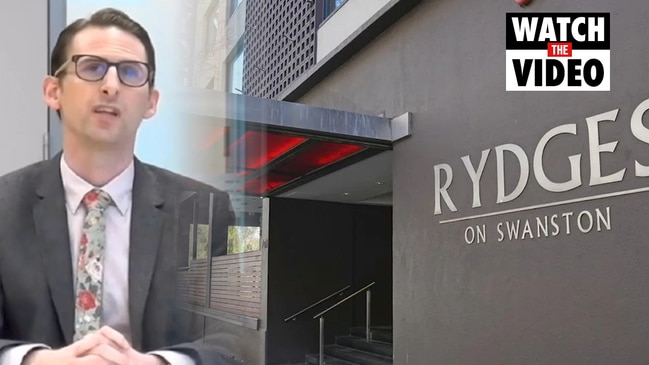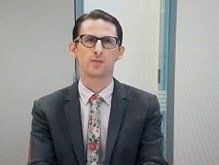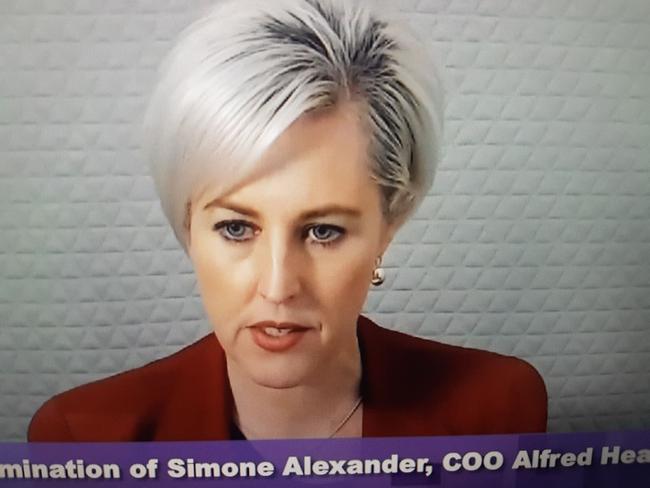Hotel inquiry: Trips to store, takeaway coffee during quarantine
The Victorian health department has admitted it would have made sense “in retrospect” to quarantine staff working in Melbourne’s hotel quarantine.

NewsWire
Don't miss out on the headlines from NewsWire. Followed categories will be added to My News.
It would have made sense “in retrospect” to quarantine staff working at Rydges hotel to prevent the major spread of COVID-19 to the community, a senior health bureaucrat has told Melbourne’s hotel quarantine inquiry.
Six positive COVID-19 cases were recorded at Rydges between May 26 and 29, and spread to cause about 90 per cent of current infections in Victoria.
One of the cases was a nurse who worked at the hotel who ended up in intensive care.
Department of Health and Human Services senior medical adviser Simon Crouch was quizzed by counsel assisting, Ben Ihle, if it was a lost opportunity to stop the virus spreading to the community during that period.
“It would make sense, with what we know now, to quarantine the staff working across that period,” Dr Crouch replied.
Mr Ihle questioned why staff were not told to at the time.
“Why, given the appreciable risk … that people had been exposed to COVID-19 between 11 and 25 May, working in the hotel quarantine program, going home to their families and loved ones, working in other sites within the program and other places, were not told, ‘There is a risk, an appreciable risk you’ve been exposed; you need to now isolate?”
“I think it’s important to reflect on the decisions as they have been made at the time, rather than necessarily with the lens of all the information we have now,” Dr Crouch replied.
Dr Crouch’s involvement focused on hotel quarantine on the Rydges and Stamford outbreaks.
At that time, he did not view catching COVID-19 from inanimate objects, known as fomite transmission, as a serious risk.
However, the experience of Rydges and Stamford hotel had changed his opinion.
“It is fair to say as of the 1st of May I was aware that fomite transmission is a possibility,” he said.
“But we didn’t have very much evidence from the outbreaks and cases we had seen up until that point in Victoria that it had played a significant role in any of the outbreaks we managed to that point.
“It does appear fomite transmission plays a larger role than I would have credit at that point.”
However, he said it is also possible the virus spread through other ways, such as person to person.

A report published by the health department’s outbreak team published in July referred to the high risk of COVID-19 cases from those in quarantine to hotel staff members due to inadequate education and inadequate cleaning, and poor PPE used by security staff.
The inquiry was told during the period of initial infections at Rydges, it took two days for a thorough clean to take place.
Dr Sarah McGuinness, who was seconded to the health department in a specialist COVID-19 response team, said she was confident the environment did not pose an ongoing risk of spreading the virus after it was disinfected.
Eight staff at Rydges tested positive to COVID-19, which has been linked to 90 per cent of cases since June in Victoria.
By contrast, 26 staff were infected at Stamford, leading to a spread linked to 10 per cent of cases in the community.
Dr McGuinness said the outbreak at Stamford hotel led to less community transmission than Rydges, because more was known about outbreaks by then.
“The Rydges outbreak was the first hotel quarantine outbreak that we had dealt with in Victoria, and indeed it was one of the first hotel quarantine outbreaks in a global sense,” she said.
“Because of our learnings from the Rydges outbreak, we took faster and more decisive measures in the Stamford outbreak.”
Dr McGinness agreed that quarantining staff earlier “may have had an impact”.
“But I think that would have been one of only many measures that could potentially have been looked at,” she said.
TRANSMISSION FROM OBJECTS UNDERESTIMATED
The risk of catching COVID-19 from inanimate objects was underestimated, the health department’s senior medical advisor has told the inquiry.
Department of Health and Human Services senior medical adviser Simon Crouch said that as of May, the spread of the virus via inanimate objects, known as fomite transmission, was not considered a significant way for the virus to spread in Victoria.
But he added his opinion changed after outbreaks at The Rydges on Swanston in Melbourne and the Stamford Plaza Hotel, which have since been identified as leading to 99 per cent of Victoria’s second wave of COVID cases.
“It is fair to say as of the 1st of May I was aware of fomite transmission is a possibility,” Dr Crouch said.
“But we didn’t have very much evidence from the outbreaks and cases we had seen up until that point in Victoria that it had played a significant role in any of the outbreaks we managed at that point.”
Dr Crouch said the experience of outbreaks managed since then had proved fomite transmission played a bigger role that he thought.
“It does appear the fomite transmission played a larger role than I had given it credit for at that point,” he said.
DIFFERENCES IN CONTACT TRACING RESULTS
Alfred Health staff raised concerns information they were getting about contact tracing differed from what the health department was advising, an inquiry has been told.
Chief operating officer of Alfred Health, Simone Alexander, told the hotel quarantine inquiry on Tuesday Alfred Health was doing contact tracing of its own staff as a matter of course.
However, staff raised concerns when contract tracing results from the department were delayed, compared to results from Alfred Health.

There was also “conflicting information” about what they were told about potential exposure to COVID-19 in regard to how long staff that may have been exposed to the virus should isolate, at what point they should be tested and their return to work.
“The conflicting information was around how long they needed to furlough and at what point they needed to get a test and around the ability to return to work,” Ms Alexander said.
Alfred Health had an expanded role in the quarantine program from about mid-June.
GUESTS LEFT HOTEL QUARANTINE FOR COFFEE
Guests in Melbourne’s bungled hotel quarantine program were seen with takeaway coffee and leaving their rooms to go to the convenience store, documents reveal.
Documents unveiled during Monday’s inquiry revealed Victoria Police Commander Timothy Tully received an email from a former police colleague on April 15 with photos that he said were of quarantined people “out again this morning”.
“One has tried to enter a convenience store on site,” the email read.
A further redacted email to Cdr Tully on April 16 about people quarantined at the Pan Pacific Hotel South Wharf noted: “They are still out and about exercising … not too many this morning. We will continue to monitor – but from my observation the exclusion zone is being poorly managed, we even saw what looked like someone with a takeaway coffee.”
At the time, the hotel operators had expressed concern, given the hotel’s location next to the DFO shopping centre, which at the time was still operating.
The issues prompted Cdr Tully to organise a “security forum” to ensure all stakeholders were on the same page regarding rules about people leaving their rooms and exercise and mental health breaks.
The hotel quarantine inquiry continues on Tuesday, with witnesses to include representatives from Alfred Health, the Department of Human Services and Safer Care Victoria.
Originally published as Hotel inquiry: Trips to store, takeaway coffee during quarantine
